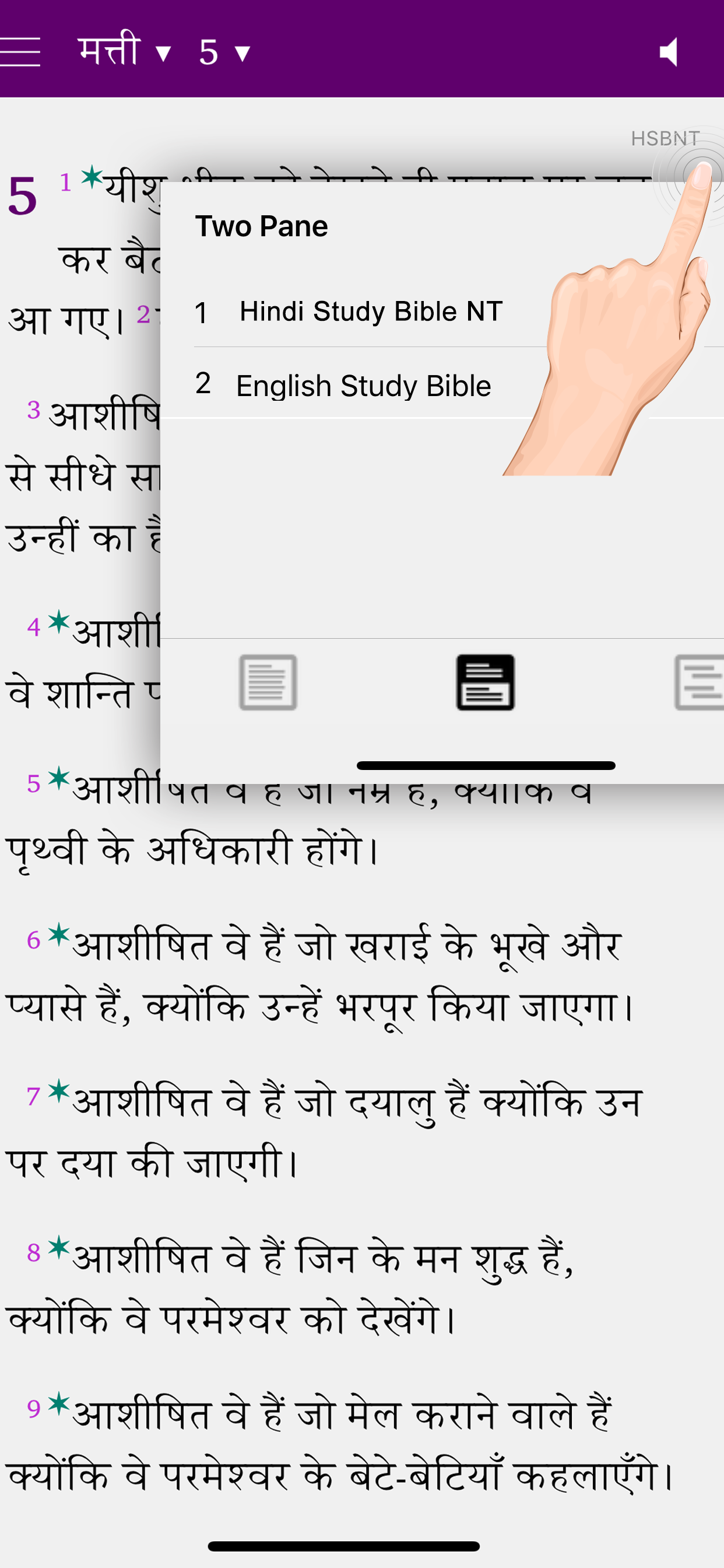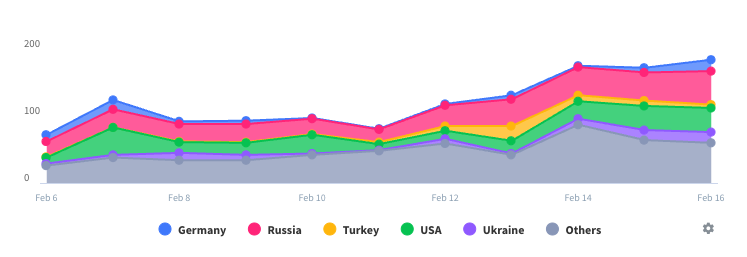
Description
Sab Ki Bible
The Hindi language is constantly changing. God’s message needs to be given in the Hindi that people use today. This is the objective of this translation.
SKB-front-cover- These days the Hindi language includes English and Urdu words. For example, the Urdu word ‘आज़ादी’ (aazaadi) is more meaningful than the Hindi word ‘स्वतंत्रता’ (swatantrata) (meaning ‘freedom’). The Urdu word is also easier to say than the Hindi word.
Nowadays there are some words that are not used in Hindi, for example, 'दाखलता’ (daakhlata), meaning 'vine' (see John 15). Everyone knows the Hindi word ‘angur’ (meaning grape) but some do not know the meaning of the Hindi word ‘daakh’ for grape. Similarly there are other Hindi words that are no longer commonly used today. Our goal is that people get the chance to read easily understood Hindi.
Some essential changes:
In English the word dove (फ़ाख्ता) (fakhta) is used for when the Holy Spirit descended upon Jesus. In all other Hindi Bibles the word used is 'कबूतर' (kabutar), meaning pigeon. There is a significant difference in both birds and their habits.
The second part of the statement of David in 2 Samuel 7:19 states: O Lord, Lord this is the rule of man. In the original language and in the English translation it is not written like this. It should be written like this: O Lord, do you treat other people in the same way? In this way we have tried to give the true and correct meaning to the words.
It is often said that the Hindi words 'तू' (tu) and 'तेरा' (tera) (meaning a very personal form of 'you' and 'your', respectively, as used for a child), etc. show closeness of relationship. The fact is that in some parts of India when we are angry we use these words also. The intent is to insult the other person. We live among people of many faiths in India. People of other faiths often do not use these words when referring to God.
Therefore in this translation we use respectful language.
We are keeping in touch with those who preach the gospel, pastors, bible scholars and teachers so it becomes 'the Bible for all' (sab ki Baibal).
Difficult Hindi words have been replaced by easy Hindi or Urdu words that are used in everyday life.
We do not claim that it is the best Bible and without mistakes. We therefore welcome comments and criticism for it to be a Bible in the hands of the people, which is easy to understand (especially for those who have not had a chance to gain more education) and where the sweetness of language makes proper sense.
THE NOTES: Our sole purpose in writing and publishing these notes has been to provide the reader with a help in better understanding the Word of God, and so put it into practice more fully. They represent many years of hard work. Great care has been taken to try to expound what is in the text of the Bible, and not to present any preconceptions or prejudices we may have. It is, of course, quite possible that we have not always succeeded in this, and the reader may sometimes find mistakes in matters of fact or errors in the interpretation of a verse or a passage.
May God alone be praised if those who use our Study Bible come to a better understanding of the truth through it. We are in hearty agreement with the psalmist who wrote, “Not to us, O LORD, not to us, but to your name give glory, because of your mercy and because of your truth” (Ps 115:1). In this we will have our joy and satisfaction.
We have provided a great many references throughout the notes and in a brief concordance at the end. We hope all these references are accurate, but are aware that mistakes in proof reading are always possible and may be found here and there. If the reader discovers any such mistakes we would appreciate having them pointed out to us.
© Dusty Sandals and Grace Ministries
Hide
Show More...
The Hindi language is constantly changing. God’s message needs to be given in the Hindi that people use today. This is the objective of this translation.
SKB-front-cover- These days the Hindi language includes English and Urdu words. For example, the Urdu word ‘आज़ादी’ (aazaadi) is more meaningful than the Hindi word ‘स्वतंत्रता’ (swatantrata) (meaning ‘freedom’). The Urdu word is also easier to say than the Hindi word.
Nowadays there are some words that are not used in Hindi, for example, 'दाखलता’ (daakhlata), meaning 'vine' (see John 15). Everyone knows the Hindi word ‘angur’ (meaning grape) but some do not know the meaning of the Hindi word ‘daakh’ for grape. Similarly there are other Hindi words that are no longer commonly used today. Our goal is that people get the chance to read easily understood Hindi.
Some essential changes:
In English the word dove (फ़ाख्ता) (fakhta) is used for when the Holy Spirit descended upon Jesus. In all other Hindi Bibles the word used is 'कबूतर' (kabutar), meaning pigeon. There is a significant difference in both birds and their habits.
The second part of the statement of David in 2 Samuel 7:19 states: O Lord, Lord this is the rule of man. In the original language and in the English translation it is not written like this. It should be written like this: O Lord, do you treat other people in the same way? In this way we have tried to give the true and correct meaning to the words.
It is often said that the Hindi words 'तू' (tu) and 'तेरा' (tera) (meaning a very personal form of 'you' and 'your', respectively, as used for a child), etc. show closeness of relationship. The fact is that in some parts of India when we are angry we use these words also. The intent is to insult the other person. We live among people of many faiths in India. People of other faiths often do not use these words when referring to God.
Therefore in this translation we use respectful language.
We are keeping in touch with those who preach the gospel, pastors, bible scholars and teachers so it becomes 'the Bible for all' (sab ki Baibal).
Difficult Hindi words have been replaced by easy Hindi or Urdu words that are used in everyday life.
We do not claim that it is the best Bible and without mistakes. We therefore welcome comments and criticism for it to be a Bible in the hands of the people, which is easy to understand (especially for those who have not had a chance to gain more education) and where the sweetness of language makes proper sense.
THE NOTES: Our sole purpose in writing and publishing these notes has been to provide the reader with a help in better understanding the Word of God, and so put it into practice more fully. They represent many years of hard work. Great care has been taken to try to expound what is in the text of the Bible, and not to present any preconceptions or prejudices we may have. It is, of course, quite possible that we have not always succeeded in this, and the reader may sometimes find mistakes in matters of fact or errors in the interpretation of a verse or a passage.
May God alone be praised if those who use our Study Bible come to a better understanding of the truth through it. We are in hearty agreement with the psalmist who wrote, “Not to us, O LORD, not to us, but to your name give glory, because of your mercy and because of your truth” (Ps 115:1). In this we will have our joy and satisfaction.
We have provided a great many references throughout the notes and in a brief concordance at the end. We hope all these references are accurate, but are aware that mistakes in proof reading are always possible and may be found here and there. If the reader discovers any such mistakes we would appreciate having them pointed out to us.
© Dusty Sandals and Grace Ministries
Screenshots
Hindi Study Bible FAQ
-
Is Hindi Study Bible free?
Yes, Hindi Study Bible is completely free and it doesn't have any in-app purchases or subscriptions.
-
Is Hindi Study Bible legit?
Not enough reviews to make a reliable assessment. The app needs more user feedback.
Thanks for the vote -
How much does Hindi Study Bible cost?
Hindi Study Bible is free.
-
What is Hindi Study Bible revenue?
To get estimated revenue of Hindi Study Bible app and other AppStore insights you can sign up to AppTail Mobile Analytics Platform.

User Rating
App is not rated in Belarus yet.

Ratings History
Hindi Study Bible Reviews
Store Rankings

Ranking History
App Ranking History not available yet

Category Rankings
App is not ranked yet
Keywords
Hindi Study Bible Installs
Last 30 daysHindi Study Bible Revenue
Last 30 daysHindi Study Bible Revenue and Downloads
Gain valuable insights into Hindi Study Bible performance with our analytics.
Sign up now to access downloads, revenue, and more.
Sign up now to access downloads, revenue, and more.
App Info
- Category
- Reference
- Publisher
-
Jeevan Nair
- Languages
- English, Hindi
- Recent release
- 2.0.5 (1 year ago )
- Released on
- Jun 1, 2020 (4 years ago )
- Also available in
- India, Pakistan, Italy, Japan, South Korea, Kuwait, Kazakhstan, Lebanon, Mexico, Malaysia, Netherlands, New Zealand, Peru, Philippines, Israel, Romania, Russia, Saudi Arabia, Sweden, Singapore, Thailand, Türkiye, Taiwan, Ukraine, United States, Vietnam, South Africa, Denmark, Argentina, Austria, Australia, Azerbaijan, Belgium, Brazil, Belarus, Canada, Switzerland, Chile, Colombia, Czechia, Germany, United Arab Emirates, Algeria, Ecuador, Egypt, Spain, Finland, France, United Kingdom, Greece, Hong Kong SAR China, Croatia, Hungary, Ireland
- Last Updated
- 1 month ago






